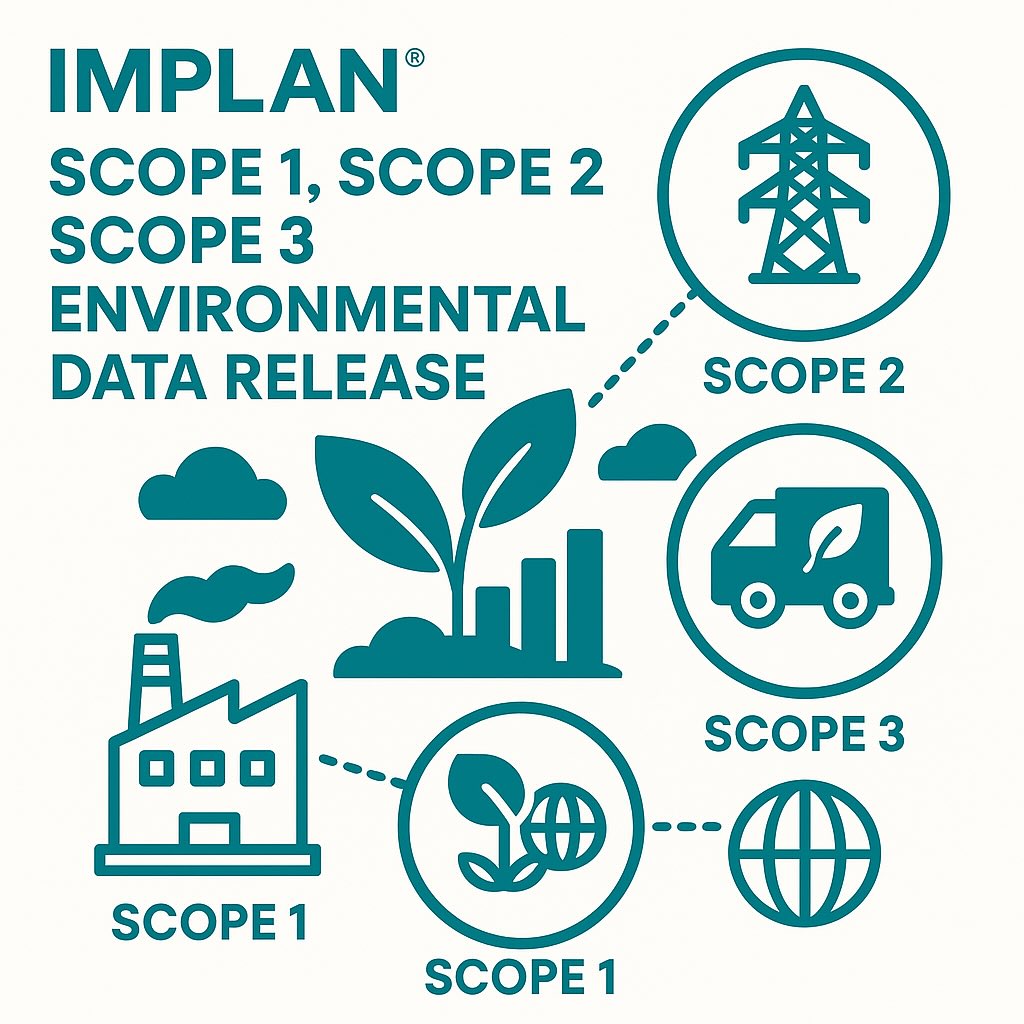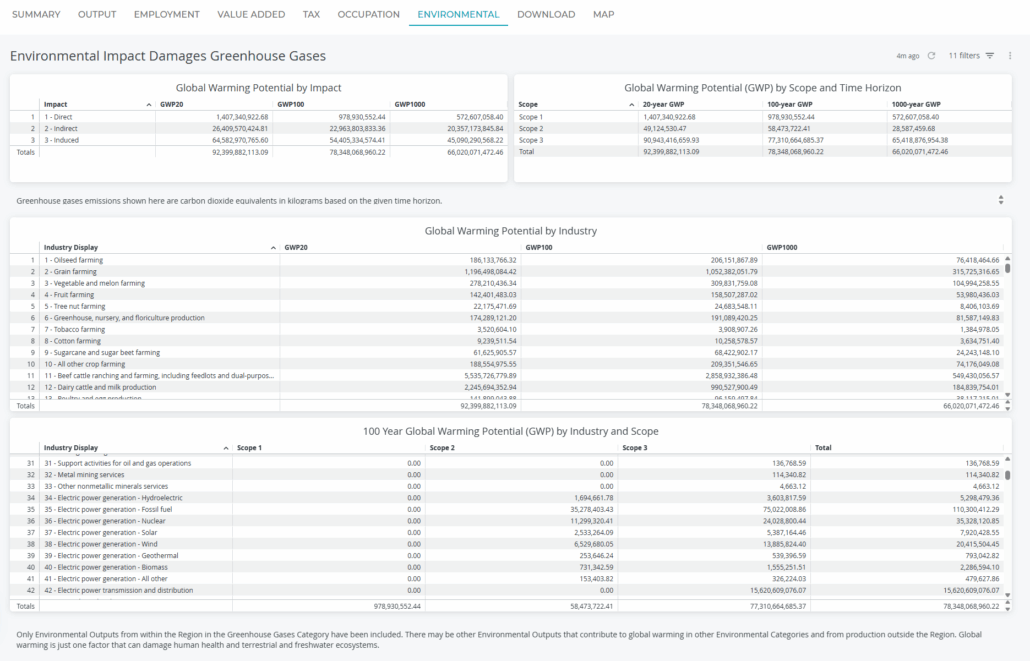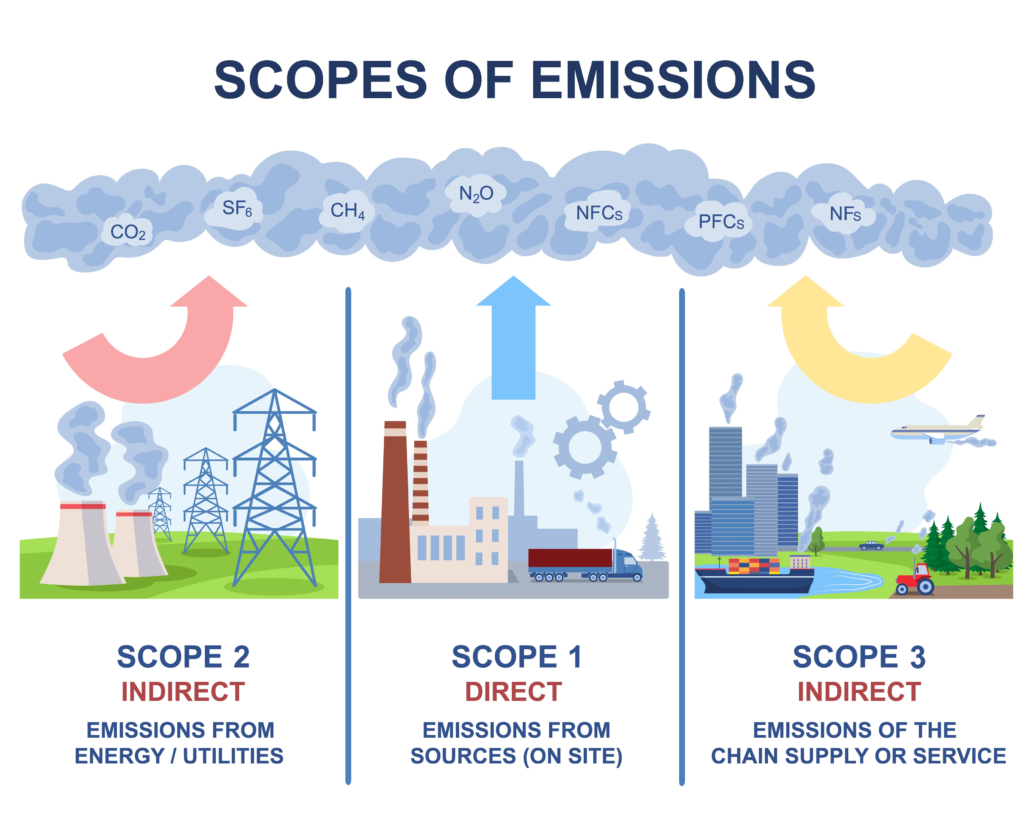Support ESG & Emissions Disclosure Compliance with IMPLAN - Scope 1, 2, and 3

Support ESG & Emissions Disclosure Compliance with IMPLAN - Scope 1, 2, and 3
What Are Scope 1, 2, and 3 emissions?
To meet evolving sustainability regulations and stakeholder expectations, organizations must track and report greenhouse gas (GHG) emissions across Scope 1, 2, and 3 categories as outlined by the Greenhouse Gas Protocol. Here’s how the scopes break down:
- Scope 1: Direct emissions from owned or controlled sources-such as factory equipment, company vehicles, or on-site fuel combustion.
- Scope 2: Indirect emissions from purchased energy-typically electricity, steam, or cooling used to power operations.
- Scope 3: All other indirect emissions in the value chain-including supplier operations, distribution, employee commuting, and product end-of-life.
Scope 3 is the largest and most complex category, often account for over 70% of total emissions. IMPLAN’s trusted 120+ data sources are vital to accurately modeling these emissions and ensuring transparency, target-setting, and compliance.
IMPLAN delivers Scope 1, 2, and 3 totals across all industries, measured in CO₂e over 20-, 100-, and 1000-year horizons. For deeper environmental benchmarking, industry-level data is available over a 100-year time span, aligning with EPA’s recommended reporting standard.
How implan helps you understand and model scope 1 emissions
IMPLAN enables organizations to assess the economic and environmental impact of their direct operations, including fuel usage and on-site processes. By integrating IMPLAN data with emissions factors, you can:
- Quantify supported jobs and GDP alongside GHG output
- Understand tradeoffs between production efficiency and sustainability
- Support emissions disclosures with contextual economic data
- Fully customize your regional analysis by ZIP, county, state, and nation
Supporting Scope 2 compliance with energy-based impact modeling
Scope 2 emissions relate to the indirect effects of purchased energy, such as electricity used in your manufacturing plants or office buildings. With IMPLAN, you can:
- Measure economic effects of transitioning to renewable energy
- Estimate the indirect impact of utility sourcing decisions
- Quantify how clean energy investments influence jobs, taxes, and output
Pairing emissions intensity with economic contributions helps you build a more balanced and credible ESG narrative.

Tackling Scope 3 Emissions using supply Chain & value chain analysis
Unpack your full economic and environmental footprint with IMPLAN. Scope 3 compliance is notoriously difficult- but IMPLAN’s supply chain modeling capabilities offer a powerful solution in a user-friendly package. Our input-output framework helps you:
- Map economic activity across suppliers & partners
- Model emissions associated with procurement, logistics, and distribution
- Assess the economic cost/benefit of supplier sqithing of value chain decarbonizations
- Align Scope 3 emissions with economic indicators like jobs supported and local tax contributions

Transparent Modeling with Credible data & methodology
IMPLAN is built on transparent, accurate input-output modeling and powered by data from 120+ public and proprietary sources. Trusted by government, academia, and the private sector, IMPLAN ensures your environmental analysis isn’t just theoretical- it’s grounded in defensible economic reality.

Who is impacted by scope 1, 2, and 3 emissions regulations?
As governments and regulatory bodies around the world strengthen their climate reporting rules, more companies are being required, or strongly incentivized, to disclose their full emissions profile. Here’s who should be paying close attention:
- Public companies in the US: Under the US SEC climate disclosure rule, publicly traded companies must report Scope 1 and 2 emissions, and in some cases Scope 3 if material or included in public climate targets. Additionally, US and global companies crossing size or revenue thresholds must comply with detailed Scope 1-3 emissions reporting.
- Companies doing business in the EU: The Corporate Sustainability Reporting Directive (CSRD) mandates climate-related disclosures for both EU-based and non-EU companies with significant operations in Europe.
- Suppliers to regulated companies: Even if your company is privately held or mid-sized, you may be required to provide emissions data to enterprise buyers that are subject to Scope 3 reporting rules.
- Federal contractors & grant recipients: The US federal government is tightening sustainability requirements for contractors and grantees. The Federal Supplier Climate Risks and Resilience Rule proposes that major contractors disclose Scope 1-3 emissions and climate targets.

Why it matters: Compliance, Reputation, and Resilience
ESG Strategy is more than a box to check- with new climate disclosure regulations on the horizon, companies that proactively track emissions and model their economic impacts gain several advantages:
- Risk mitigation: identify carbon-intensive suppliers and operations before regulators or investors do.
- Investor confidence: strengthen ESG scoring, sustainability ratings, and annual disclosures.
- Incentive access: qualify for grants, tax credits, and public-private partnerships related to clean energy and sustainability.
- Community relations: show local governments and stakeholders how your company delivers both economic and environmental value.
Interested in learning more? View our latest Scope 123 blog post now.
Request a Demo
Start Your Impact Analysis Today
In today’s fast-paced economic landscape, making informed decisions requires more than just raw data—it’s about having the right tools to transform that data into actionable insights. IMPLAN offers a robust, user-friendly solution for data aggregation, empowering businesses, researchers, and policymakers to seamlessly collect, analyze, and interpret complex economic data.



